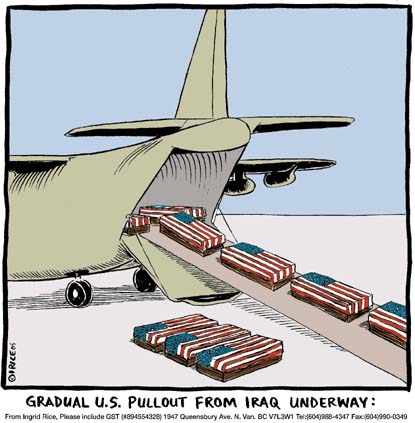8.7 billion gone - Corruption Galore
Who is more corrupt? Karsai? Tin-Pot dicators?
BBC NEWS: US 'fails to account' for Iraq reconstruction billions

Billions have gone to rebuild Iraq but much of the money is impossible to trace, says a US audit
A US federal watchdog has criticised the US military for failing to account properly for billions of dollars it received to help rebuild Iraq.
The Special Inspector General for Iraq Reconstruction says the US Department of Defence is unable to account properly for 96% of the money.
Out of just over $9bn (£5.8bn), $8.7bn is unaccounted for, the inspector says.
The US military said the funds were not necessarily missing, but that spending records might have been archived.
In a response attached to the report, it said attempting to account for the money might require "significant archival retrieval efforts".

Reconstruction money
"The funds are separate from the $53bn allocated by the US Congress for rebuilding Iraq.
Much of the money came from the sale of Iraqi oil and gas, and some frozen Saddam Hussein-era assets were also sold off.
End Quote Special Inspector General for Iraq Reconstruction"The breakdown in controls left the funds vulnerable to inappropriate uses and undetected loss"
The money was in a special fund administered by the US Department of Defense, the Development Fund for Iraq (DFI), and was earmarked for reconstruction projects.
But the report says that a lack of proper accounting and poor oversight makes it impossible to say exactly what happened to most of it.

According to the report, the Pentagon is unable to fully account for $8.7bn of funds it withdrew between 2004 and 2007, and of that amount it "could not provide documentation to substantiate how it spent $2.6bn".
Past mismanagementThe audit blamed the inability to account for the money on a number of factors.
Notably, it said that most defence department organisations which received DFI funds failed to set up US Treasury Department accounts for the money as required.
It also said that there was no central organisation within the defence department which was charged with overseeing how the funds were accounted for or spent.
"The breakdown in controls left the funds vulnerable to inappropriate uses and undetected loss," the report said.
This is not the first time that allegations of missing billions have surfaced in relation to the US-led invasion of Iraq and its aftermath.
In 2005, the inspector general criticised the Coalition Provisional Authority, the US-led occupation administration, for its management of an $8.8bn fund that belonged to the Iraqi government.
A criminal investigation conducted led to the conviction of eight US officials on bribery, fraud and money-laundering charges.
The latest audit does not include allegations of criminal conduct.
Sarbanes–Oxley Act

The Sarbanes–Oxley Act of 2002 (Pub.L. 107-204, 116 Stat. 745, enacted July 30, 2002), also known as the 'Public Company Accounting Reform and Investor Protection Act' (in the Senate) and 'Corporate and Auditing Accountability and Responsibility Act' (in the House) and commonly called Sarbanes–Oxley, Sarbox or SOX, is a United States federal law enacted on July 30, 2002, which set new or enhanced standards for all U.S. public company boards, management and public accounting firms. It is named after sponsors U.S. Senator Paul Sarbanes (D-MD) and U.S. Representative Michael G. Oxley (R-OH).

The bill was enacted as a reaction to a number of major corporate and accounting scandals including those affecting Enron, Tyco International, Adelphia, Peregrine Systems and WorldCom. These scandals, which cost investors billions of dollars when the share prices of affected companies collapsed, shook public confidence in the nation's securities markets.
It does not apply to privately held companies.

 Earth's magnetic field:
Earth's magnetic field:


0 Comments:
Post a Comment
<< Home